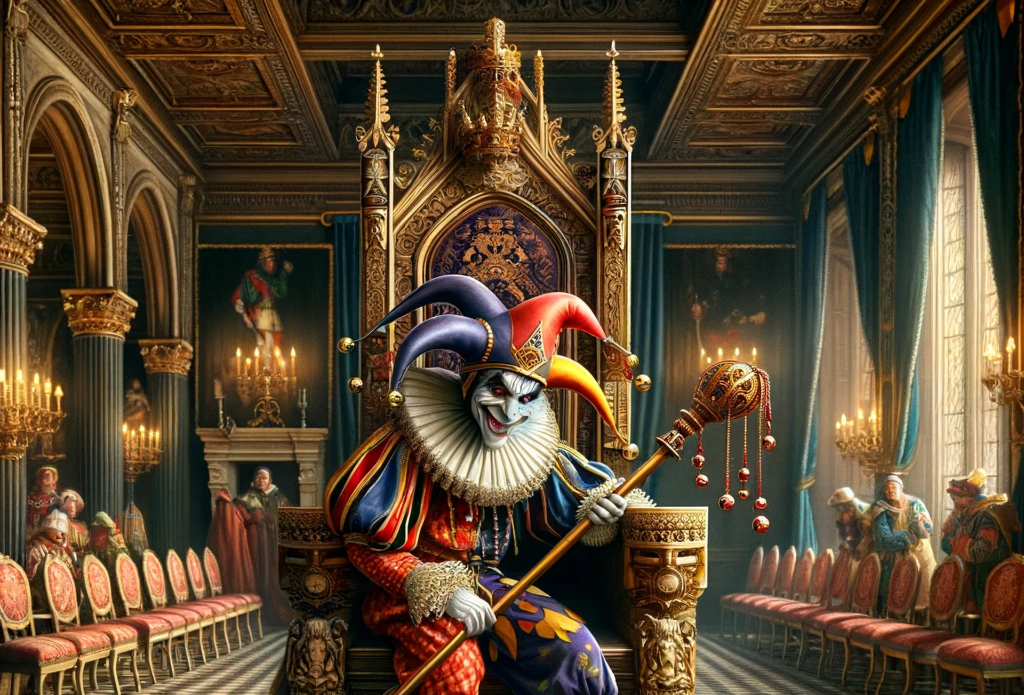In ancient Greece there was a term, parresia, which implied freedom of speech and the obligation to speak truthfully, for the benefit of the common good and even at the risk of one’s own life. This expression meant, etymologically, “to say everything”, “to speak freely” or “to speak boldly”.
During the Middle Ages, the jester became the courtly representation of parresia, which was associated with the exercise of truth and was able to ironize the king. The jester represented a reality that, in the eyes of royalty, was eccentric and chaotic. His function was to bring a fragment of this monstrous but essentially true world into the court.
William Shakespeare knew a lot about jesters and portrayed some memorable ones in plays such as Twelfth Night (1602) and King Lear (1606). He also anticipated the jester’s rise to power in his famous Macbeth (1623): a play that includes witches, the walking dead, culpable betrayals, decapitations and, above all, the ambition for power for no other reason than simple narcissistic satisfaction.
It has often been said that Macbeth is a montage about power, though perhaps we have lost sight of the fact that it is a montage about montages. That is, about conspiracies, lies and smokescreens, about acting and about rulers who act below dramatic standards but above the people’s ability to decipher their unusual and contrived moves.
Berlusconi, the anticipator
In 2008, philosopher Rafael Argullol published an article in the newspaper El País entitled El rey bufón, in which he referred to the election of businessman and tycoon Silvio Berlusconi as head of the Italian government. Argullol commented at the time:
“Although Berlusconi has genuinely Italian characteristics, he transcends the Italian political scene and, in this sense, has become an archetype that affects us all. The most worrying thing is that in many respects Berlusconi is emerging, not so much as a remnant of the immediate past, but as an anticipator of future times”.
According to Argullol, Berlusconi’s strategic move consisted in usurping and exchanging the roles of king and jester, presenting them in the form of a crude joke and a mirage:
“On the one hand, the absolute king who seizes most of the levers of power; on the other hand, the jester who grotesquely distorts the landscape, although not to proclaim the truth, as medieval or baroque jesters would do, but to reinforce the lie”.
In our days
In a recently published article, geologist Emma Tristán refers to some contemporary politicians such as Donald Trump, Nayib Bukele and Rodrigo Chaves as “professional stirrers”. Indeed, these rulers do not miss the opportunity to sow unrest and doubt around them, like sorcerer’s apprentices of Joseph Goebbels, Adolf Hitler‘s propaganda minister, often remembered for the phrase: “lie, lie, that something will remain.” As Tristan comments in his text, this year Goebbels’ teachings turn a century old and seem more valid than ever.
The list of contemporary professional agitators can easily be extended by adding the names of other figures of a similar disposition, such as Argentina’s Javier Milei or Brazil’s Jair Bolsonaro. Thus, it is easy to deduce that these authoritarian rulers, who consider any public space as the ideal stage for the propagation of mockery and lies, represent a phenomenon of global scale. A sad sign of our times.
The buffoon kings announced by Argullol in his article use provocation and scandal to draw attention to their actions, but also to distort or disguise them. They place themselves at the antipodes of truth and use it, adjusting it to their purposes.
Faced with the failure of his attempt to impose policies that are not socially legitimized, the buffoon king resorts to the substitution of democratic procedures, the signing of decrees, the calling of plebiscites, the storming of assemblies and parliaments and the bombastic publications on his social networks. All loaded with clamor, with the desire for control and power, as Shakespeare anticipated four centuries ago.
The jester king fills the air with empty mockery and dark gestures. This is why it is difficult to read one of Macbeth’s most famous quotes without finding it revealing and prescient: “Life is but a walking shadow; a bad actor who struts and struts and flails for an hour on the stage and then is not heard again. It is a tale told by an idiot, full of sound and fury, signifying nothing.”

